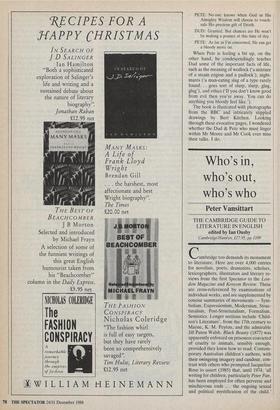Who's in, who's out, who's who
Peter Vansittart
THE CAMBRIDGE GUIDE TO LITERATURE IN ENGLISH edited by Ian Ousby CambridgelHamlyn, £17.95, pp.1109 Cambridge too demands its monument to literature. Here are over 4,000 entries for novelists, poets, dramatists, scholars, lexicographers, illustrators and literary re- views from the first Spectator to the Lon- don Magazine and Kenyon Review. These are cross-referenced by examinations of individual works, and are supplemented by concise summaries of movements — Sym- bolism, Expressionism, Modernism, Struc- turalism, Post-Structuralism, Formalism, Semiotics. Longer sections include 'Child- ren's Literature', from the 17th century to Mayne, K. M. Peyton, and the admirable Jill Paton Walsh. Black Beauty (1877) was apparently enforced on prisoners convicted of cruelty to animals, sensibly enough, provided they knew how to read. Contem- porary Australian children's authors, with their swingeing imagery and candour, con- trast with others who prompted Jacqueline Rose to assert (1985) that, until 1974, 'all writing for children, particularly Peter Pan, has been employed for often perverse and mischievous ends ... the ongoing sexual and political mystification of the child.' Other essays include 'Courtly Love', 'Lib- raries', the 'Bible in English', 'Detective Fiction', though not 'Translators', 'Biogra- phy', 'Travel'. Television and radio writ- ing is mentioned only as part of the general work of such writers as David Mercer and John Mortimer. Seeking 'Philosophy', I found only Philotas,' a blank verse tragedy, 1605. 'British Empire' is omitted, though such phenomena as G. A. Henty and P. C. Wren are individually discussed, also Rider Haggard, whose She so impress- ed Jung, and Graham Greene. The erudite 'English Language' maintains, 'constant vigilance is needed to save the inexhausti- ble well from turning into a snake pit,' but, like 'Slang,' the teaching of English is no treated directly, thus losing an opportunity for revelations, lamentable, incredible, dreadful. Relieving the threat of monotony from so many titles, outlines, dates ('Dates', protested the courtesan, Harriet Wilson, 'make stories dry and ladies ner- vous'), are some 300 illustrations, few unexpected, but apposite enough. The favoured authors are not only the classic but many who, though derided by critics, were treasured by readers; amongst them, Edgar Rice Burroughs, Edgar Wallace, Marie CoreIli, Naomi Jacob, Warwick Deeping, Hugh Walpole.
'Science Fiction' gets in, but not 'Histor- ical Fiction,' though some practitioners appear, with overdue justice given to the versatile Jack Lindsay, who must have given many, including myself, their first exciting vistas of classical history.
Personal entries are usually more bland- ly autobiographical than critical. Wode- house's verbal agility is actually ignored, lost amongst details of his career. Belloc, as historian, was vivid, rumbustious, head- strong and, putting it politely, inventive, but his entry merely states, 'he wrote several histories.' Far better treatment is allowed the great 14th-century poet, Dafydd ap Gwilym. Scrutiny of individual novels and plays tends merely to summa- rise plots rather than to analyse themes and imagery. Thus, space for the plot of The Quiet American is three times longer than that given to the entire output of Peter Quennell.
Absentees? Plenty. We will all have our lists. My touchstone was R. C. Hutch- inson, surely finer than most of the Booker elite. He gets brief attention, but none is allowed Sybille Bedford, Frederic Pro- kosch, Christopher Hope, Julia O'Faolain, Robert Nye, William Boyd, John Home Burns, Marina Warner, John Banville. Readers can nevertheless test their insular- ity by identifying the craft and nationality of such authors as Okai, Bekederemo Wendt, Kunene, Kolatka, Okigbo, Bat- tacharya, Mankire, Sepamla, Mwangi, Mphahlele, Awoonar. Nigerian, Indian and Caribbean literature seem particular- ly thriving. Samoa gets represented, though not King Tchaka of Zululand, whom John Masefield recorded as endless- ly reciting his solitary literary work:
What nations have I scattered? Who next shall be battered?
Selection of academics seems capricious. G. M. and Otto Trevelyan, and Arnold Toynbee, but not Namier, Elton, Stone, Trevor-Roper, Rowse, Zeldin, Taylor, Frances Yates; G. E. Moore, Russell, Ayer, but not Popper, Oakeshott, Berlin; Leavis, Steiner, Raymond Williams, not Kermode, not Bayley. Instead of A. N. Whitehead we get William, a forgotten Poet Laureate, and Charles, author of Jack Ketch and son of a wine merchant. 'His career was blighted by drink.'
Inevitable comparisons will be made with The Oxford Companion to English Literature. There is considerable overlap- ping, but some conspicuous differences. Margaret Drabble included many con- tinental writers, but Ousby discusses them only within the movements associated with them. He excludes, surely rightly, Drab- ble's European composers, who occupy space better suited to literary matters. Her Beethoven entry concludes, 'his purely musical connections with Britain are tenuous.' Less happily, he does not follow her in adding bibliographies. Thus, no reference to Eliot on Kipling, Ellmann on Joyce, Annan on Leslie Stephen, Crick on Orwell, Peter Green on Kenneth Gra- hame. Fortunately, he does not follow Drabble's ban on writers born after 1939. This allows in Theroux, Okri, Julian Barnes, Peter Ackroyd, Ian McEwan, Craig Raine, Andrew Motion, A. N. Wil- son, though, oddly, not Colin Thubron.
This is a fat middlebrow reference book, useful for students short on facts, reviewers in a hurry, combatants arguing about the works or provenance of Cuthbert Bede, Laurence Eusden, Benjamin Hoadly. Harold Munro needs correction. Michael Roberts wrote The Recovery of the West, not of 'the war'. There is scope for pleasant browsing. Not everyone will know that Shakespeare's Richard Burbage was a celebrated painter, that General Burgoyne lost America but won acclaim as dramatist, librettist and social commentator, that Gore Vidal writes detective stories as 'Edgar Box', and that George Best, author-navigator, died in 1584.











































































































 Previous page
Previous page